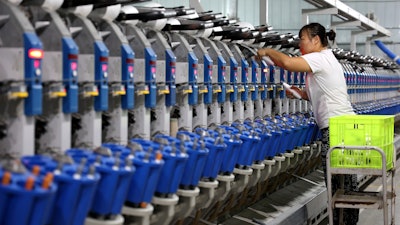
BEIJING (AP) — Chinese consumer spending contracted in October and factory activity weakened as anti-virus controls following a rise in infections weighed on the economy.
Retail sales sank 0.5% compared with a year ago, down from September's 2.5% expansion, as millions of people were confined to their homes, government data showed Tuesday. Growth in factory output decelerated to 5% from the previous month's 6.3%.
The performance was even weaker than expected by forecasters who said activity would cool as Chinese anti-virus controls and interest rate hikes by the U.S. Federal Reserve and other central banks weighed on global activity.
"November is shaping up to be even worse," said Zichun Huang of Capital Economics in a report.
Chinese economic growth rebounded to 3.9% over a year earlier in the three months ending in September from the first half's 2.2%, but economists say activity already was cooling. They have cut forecasts of annual growth to as low as 3%, which would be among the weakest in decades.
October imports shrank 0.7% from a year earlier, down from the previous month's 0.3% expansion as consumer demand fell, according to customs data released earlier. Exports declined 0.3%, a reverse from September's 5.7% rise.
Business and consumer activity slumped in mid-2021 after the government tightened controls on use of debt by China's vast real estate industry, a major engine of growth. Housing sales and construction, which employs millions of people, plummeted.
President Xi Jinping's government has been trying to prop up growth without reviving a rise in corporate and household debt that Beijing worries is dangerously high.
Anti-virus controls were tightened in areas across China following an uptick in infections in mid-October. Apple Inc. warned deliveries of its new iPhone 14 model would be delayed after access to an industrial zone around its biggest factory was suspended due to outbreaks.
Beijing announced last week it would try to reduce the impact of its "zero-COVID" strategy, which aims to isolate every infected person, by shortening the quarantine for travelers arriving from abroad and making other changes.
However, authorities said they are sticking to a goal of trying to keep cases near zero at a time when other countries are relaxing controls and trying to live with the virus.
The new approach is "a bit of a gamble," Huang wrote. "It could result in greater spread of the virus, eventually triggering a more forceful response."





















